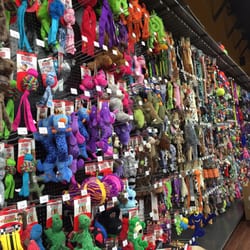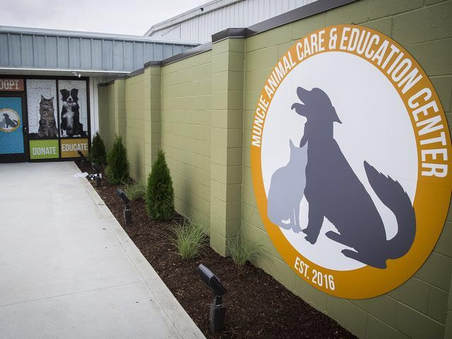 I spent part of my lunch hour at a local pet supply store recently. It was a serious case of sensory overload. One whole wall is devoted to toys of every shape and size. It reaches from the floor all the way to the ceiling. I was in the store looking for a couple of Rusty-proof toys for our new dog. We learned pretty soon after we adopted him a few months back that fabric toys and even toys made out of ballistic nylon are no match for his teeth. Toys that are generally rated as chew-proof have not lasted particularly long and we've found he does best with rubber toys like the Kong Extreme, the GoughNuts ring, the Play Strong Bone and the West Paw Zogoflex Zisc. I found a couple of new toys in the store I think he'll like, a travel water bowl and a rug designed for drying off wet dogs to fit into our routine of wiping damp/wet feet and body every time we come inside. The dog's, of course. I know a lot of people think that buying toys for pets during the holidays is nuts. Luckily I know more people who do just what we do. They consider their companion animals family members and they shop for their pets just like they shop for parents, siblings and children. I won't go so far as to ask Rusty to wear an antler headband so I can take cute photos, but he will get some gifts from Santa Paws, along with the stocking I'm cross-stitching with his image on the front. On an intellectual level, I know that giving him gifts is more for our benefit than ours. As a formerly chained dog who lived outside before he ended up in an animal shelter, he's almost as easily entertained with rocks and leaves as he is with dog toys. Much like a cat who shuns a fancy toy in favor of an empty box or a paper sack, he is used to keeping himself entertained and could get by just fine without toys or special towels (although the elevated feeding tray with his name on it which was lovingly made by my husband will actually serve a purpose related to his digestion). We shop for him so that he feels included and because "we are pack." All this shopping got me thinking back to a concept I have mentioned before and which I'd like to mention again during this season of love, compassion and giving of gifts.
Most of us love our companion animals and do treat them like family members with fur, feathers or scales. Because of that love and how much we value them in our lives, we want the very best for them. Always. Which is why I sincerely hope you will take some time during the holiday season to give your pets the most important gift of all: the gift of security. None of us knows how long we will live or what tragedies may change our lives with no notice. We can get sick, lose our job, lose our home to a fire or die in an automobile accident. The list of what ifs is almost endless. If something happened to you, who would take your pets and love them as you do? If you have family or friends who live close to you, you may assume they'll step up and care for your pets. I've seen enough emails, texts and posts on the Internet and social media to know that is not always the case. Animals end up in shelters or with rescue groups every day because of some unexpected tragedy and because the person who cared for them failed to make a plan for their care. Please give your pets the gift of a Pet Parent. This is a person you've talked to ahead of time who has agreed to take your pets in the event you died or could no longer care for them for some reason. In choosing your Pet Parent, be mindful of how your pet gets along with other animals and their general health. Give some thought to whether or not you should include financial provisions in your will to pay for the care of your pets for the rest of their lives. Consider how someone would communicate with the Pet Parent on your behalf if something happened to you. Do not just presume that someone will step up and take your pet or pets - this calls for an actual conversation to make plans just like those made for your children. We have a plan in the event that anything ever happens to both of us at one time. Rusty will go to live with a member of our family in Texas who will help him adapt to living in her home with her rescued dogs and who will love him as we love him. And she will care for him the rest of his days. We'd like to think the odds of this happening are really small. But we'd rather have plans and never need them than to have Rusty put at risk in some way. I think Rusty will like the gifts we're giving him this year, although he'll still play with leaves. I know that we'll sleep better at night knowing that we are prepared to give him the best possible gift by ensuring he is cared for the rest of his life, even if it is not by us. Please think about it.
1 Comment
 I have been blogging a lot lately about the topic of animal shelters and particularly those shelters which destroy healthy and treatable pets. I try to cover a number of topics on my website related to companion animals, but they are all related to the bigger issue of what happens in our nation's animal shelters using our tax dollars. Puppy mills contribute millions of dogs to the market which causes dogs to end up in shelters. Chaining dogs and treating them as resident dogs leads to dogs being in our shelters, perhaps following some attack or fatality. Failure to spay and neuter animals leads to higher animal populations in our communities which means more animals end up in shelters. Failure to embrace TNR (trap, neuter, return) as the most humane method of helping populations of free roaming cats causes more cats to end up in our shelters, with most of them being summarily destroyed. It's been a tough year from where I sit related to this primary topic of shelters where healthy and treatable animals die. I have seen the shelter in the city where I work fail to sustain progress achieved last year, going back to a culture in which it is permissible to destroy healthy and treatable dogs and label them as having had issues with "behavior." I have seen an organization in a city a couple hours south of me continue to destroy about half of the animals entrusted to its care while still managing to maintain a cult-like following of supporters who either don't know how their tax dollars and donations are being spent or who remain willfully ignorant of what is happening. I have interacted with self-proclaimed animal advocates in other states who have defended the killing of animals in tax-funded shelters while labeling those who are speaking out to change that culture as the source of the problem. There is a balance to all this bad news, of course. There are incredible things happening in some parts of the country related to shelter animals. Doug Rae of the Humane Society of Fremont County in Colorado was given the Henry Bergh Award for his wonderful life saving work at his shelter where he saves the lives of nearly 100% of his intake. Lake County, Florida, had a shift in culture thanks to the tireless advocacy of Steve Shank and Mike Fry, who managed to get county commissioners on board with a change in culture, leading to a transition to No Kill almost overnight. Phil Peckinpaugh advanced a Companion Animal Protection Act in Muncie, Indiana, which provides that the live release rate at the city shelter will never fall below 90%, among other life-saving and life-affirming provisions. Advocates in Pueblo, Colorado are on the verge of having the Pueblo Animal Protection Act codified, thanks to support from some former and current members of the city council. But back to reality for a minute. For all of the wonderful things happening related to animal sheltering across the country, the grim reality is that most shelters still destroy the vast majority of the animals entrusted to their care as many people do not know it is happening, do not understand it does not have to happen, defend the killing as some Orwellian form of public service or continues to blame the public as a whole. Even thought it is that very same public which needs to be brought to the table so that they can make better personal choices, so they will adopt, so they will foster, so they will volunteer and so they will donate. If you run a tax funded animal shelter where you still destroy healthy and treatable animals, please tell me why you still do that instead of embracing proven No Kill programs being used across the country to save those lives and which have been known for almost 20 years. If you run a tax funded animal shelter and you are offered free help from subject matter experts and you refuse that free help, please tell me why your arrogance continues to be the primary obstacle to saving the lives of animals entrusted to your care. If you run a tax funded animal shelter and you are provided with researched and reasonable recommendations by animal welfare advocates on how to keep more animals alive without spending any more money, please tell me why it is that you refuse to even consider those recommendations even though they could bring about positive changes, possibly even making you look like a hero in the process. If you run a tax funded animal shelter and you are incapable of listening to constructive criticism for how you spend public money, please tell me why you remain employed as a pubic servant when you have no intention of being responsive to the public you serve. If you know that your local tax funded animal shelter destroys healthy and treatable animals using your money and donations, please tell me why you not only support that behavior but you defend it. If you volunteer for or otherwise support a tax funded animal shelter which destroys healthy and treatable animals using your money and donations, please tell me why you have not tried to educate yourself about No Kill programs and services in order to use your influence to change the culture at the shelter to stop them from destroying animals who either were, our could have become, someone's beloved companion. I'm not being flippant. I'd really like someone to help me understand all of these behaviors. Our nation's animal shelters are funded by us, the public. We pay for what happens in those buildings whether it is wonderful, good, bad, heart breaking or criminal. It is time for us to all speak out for how we want our money spent, for us to demand better of those employed using our money and to focus on saving the lives of the companion animals we say we value. It is a betrayal of the public trust for those who manage our animal shelters to destroy animals by the thousands while at the same time blaming us for doing that and failing to fully embrace proven methods to stop it not years from not but right now. Please just tell me why. (image of the Muncie Animal Care and Education Center courtesy of the No Kill Advocacy Center)
|
AuthorI am an animal welfare advocate. My goal is to help people understand some basic issues related to companion animals in America. Awareness leads to education leads to action leads to change. Archives
July 2024
Categories
All
image courtesy of Terrah Johnson
|




 RSS Feed
RSS Feed